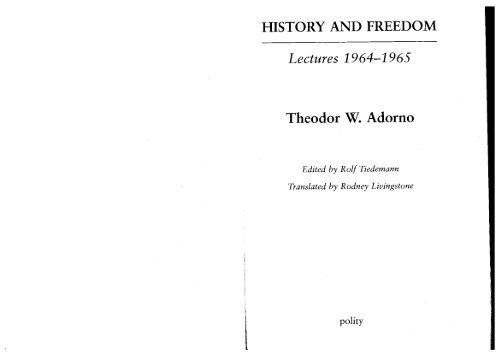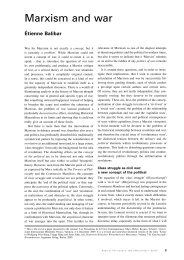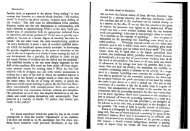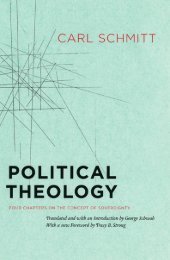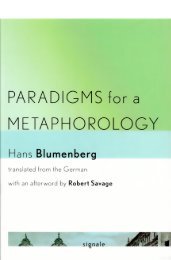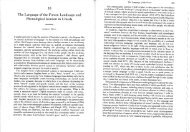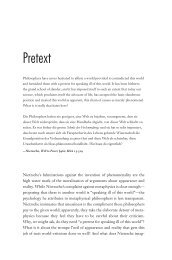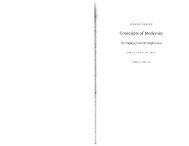Adorno - History & Freedom lectures - 1-4.pdf - Townsend ...
Adorno - History & Freedom lectures - 1-4.pdf - Townsend ...
Adorno - History & Freedom lectures - 1-4.pdf - Townsend ...
You also want an ePaper? Increase the reach of your titles
YUMPU automatically turns print PDFs into web optimized ePapers that Google loves.
'<br />
l<br />
HISTORY AND FREEDOM<br />
Lectures 1964-1965<br />
Theodor W. <strong>Adorno</strong><br />
Edited by Rolf Tiedemann<br />
Translated by Rodney Livingstone<br />
polity
First published in German as Zur Lehre von der Geschichte und von der<br />
Freiheit (1964165} by Theodor W. <strong>Adorno</strong>© Suhrkamp Verlag, Frankfurt<br />
am Main, 2001.<br />
This English edition first published in 2006 ©Polity Press<br />
Reprinted in 2008<br />
Polity Press<br />
65 Bridge Street<br />
Cambridge CB2 1 UR, UK<br />
Polity Press<br />
350 Main Street<br />
Malden, MA 02148, USA<br />
All rights reserved. Except for the quotation of short passages for the<br />
purpose of criticism and review, no part of this publication may be<br />
reproduced, stored in a retrieval system, or transmitted, in any form or by<br />
any means, electronic, mechanical, photocopying, recording or otherwise,<br />
without the prior permission of the publisher.<br />
ISBN-13: 978-07456-3012-0<br />
ISBN-13: 978-07456-3013-7 (pb)<br />
A catalogue record for this book is available from the British Library.<br />
Typeset in 10.5 on 12 pt Sabon<br />
by SNP Best-set Typesetter I.td, Hong Kong<br />
Printed and bound in the United States by Odyssey Press Inc., Gonic,<br />
New Hampshire<br />
For further information on Polity, visit our website: www.polity.co.uk<br />
The publication of this work was supported by a grant from the<br />
Goethe-lnstitut.<br />
Editor's Foreword<br />
CONTENTS<br />
PART I <strong>History</strong><br />
LECTURE 1: Progress or Regression?<br />
Notes: The relationship of the <strong>lectures</strong> to Negative<br />
Dialectics; the concept of freedom in Kant and Hegel; the<br />
diminishing consciousness of freedom; the meaning of<br />
history refuted by Auschwitz; the philosophy of history<br />
implies that there is a meaning; cultural morphology<br />
(Spengler) and idealism<br />
LEcTuRE 2: Universal and Particular<br />
Trend and individual fact • Distance from and closeness to<br />
detail; progress as a particular • Rationality as a universal;<br />
rationality as the mastering of nature • The concept of<br />
universal history; rationality as a form of conflict; 'Faustian<br />
technology' and modes of production • Hegel's concept of<br />
spirit [ Geistl; spirit and technical rationality; spirit not<br />
primary, but a product • The immediate experience of the<br />
universal and the universal itself denounced as metaphysics;<br />
negativity as a universal<br />
Xll<br />
3<br />
10
<strong>Adorno</strong>'s notes for this lecture:<br />
LECTURE 1<br />
10 November 1964<br />
PROGRESS OR<br />
REGRESSION? 1<br />
Refer to the special situation of this lecture course. 2<br />
From a book on dialectics, i.e., to be treated as completed sections<br />
of a dialectical philosophy; that is to say, not as individual<br />
phenomena independent of the overall conception.<br />
Legitimate in the sense that the two complexes to be treated have<br />
always been at the core of a dialectical philosophy.<br />
Thus in Kant the relation of the realm of freedom to history is<br />
mediated by conflict [Antagonismus].<br />
While in Hegel history is regarded immediately as progress in the<br />
consciousness of freedom, such that consciousness for Hegel amounts<br />
io a realized freedom. 3<br />
This doctrine is extremely precarious. Shall concentrate on its<br />
problematic nature, i.e., the actual historical relation of universal and<br />
particular. · ... ·· ··- ··<br />
· Even with the greatest generosity and with the aid of a spiral<br />
theory,' it is no longer possible to make the case for such progress<br />
directly:<br />
objectively, because of the increasingly dense texture of society<br />
both in the East and in the West, the intensification of the process of<br />
concentration and of bureaucratization which has the effect of reducing<br />
people more and more to the status of functions. <strong>Freedom</strong> is<br />
limited to self-preservation. Even the most highly placed are merely<br />
functions of their function.
LL<br />
Lt.LlUKh j<br />
times.< In this book every speculation about history, and indeed every<br />
attempt to conceptualize history, appears to be treated as a subjective<br />
stylization that may be unavoidable but one that is also exposed to<br />
all the risks of relativism. This is a view that seems to me to be worthy<br />
of criticism. It can also be found in an extreme form in Theodor<br />
Lessing's book Geschichte als Sinngebung des Sinnlosen [<strong>History</strong> as<br />
giving meaning to the meaningless];' a book that I nevertheless find<br />
remarkable in its own way and·commend to you as an example of a<br />
negative philosophy of history. I should point out, however, that a<br />
chasm separates the so-called idealism of a semi-Kantian such as<br />
Simmel from Hegel's absolute idealism, and that it is in their theory<br />
of history that they can be seen to be at their most antithetical. Paradoxically,<br />
Hegel's theory of the objective nature of history has a far<br />
greater realism than Simmel's in the sense that this objectivity has a<br />
far greater validity in actuality. I would make only one general point<br />
in criticism of Simmel. This is that the entire problem presented itself<br />
in a manner that was typical 9f grand philosophy in the late nineteenth<br />
and early twentieth century. It manifested itself in the concept<br />
of the constitutum, what Was constituted, in other words, the way in<br />
which both objects and the truth were constituted was not explored<br />
in a radical fashion in this philosophy. Instead, thinking took place<br />
in an already constituted world, in which already constituted human<br />
beings behave in various ways towards already constituted objects of<br />
knowledge, and where these forms of behaviour are investigated in<br />
their turn. We may say that this procedure is roughly analogous to<br />
so-called subjective economics, marginal utility theory, 6 in which<br />
exchange relations within an already constituted barter society are<br />
analysed without inquiring into the way in which the exchange relationship,<br />
its true objective meaning, ha"s been constructed. At bottom,<br />
for all his subtlety, Simmel's analysis is lacking in reflection; he is<br />
concerned with the way in which an existing mind relates to already<br />
existing facts.<br />
I want to confine my criticism purely to the essential issue, simply<br />
to clarify its relevance to our own problem here. The point is that<br />
what is secondary according to his theory, namely what we owe to<br />
the knowing mind, the course of history, the historical trend, the<br />
dynamic of history that prevails despite the efforts of human beings<br />
-that secondary aspect is in reality the thing that constitutes objective<br />
reality. It is in fact the objective nature of history in which individual<br />
subjects have their being that has primacy over all the human subjects<br />
that according to him are supposed to give shape to history. Simmel's<br />
entire philosophy, then, is marked by a methodological hysteron<br />
proteron, a putting of the cart before the horse. And I would say that<br />
'<br />
CONSTITUTION PROBLEMS 23<br />
this is one of the underlying experiences that have been engendered<br />
by the historical events of our own age. Simmel died in 1918 and so<br />
does not properly belong to our own period. He still tended to think<br />
of history in much the same way as the joke lines 'in Faust in which<br />
history takes place in faraway Turkey where 'armies come to blows'.'<br />
What in his lifetime could be shaped and inspected, like a collection<br />
of china in a glass case, has in the meantime come far too close for<br />
comfort. Confronted with this change, the very idea of the historian<br />
who can choose and shape events to his own taste and in accordance<br />
with his own interests has faded into myth, a myth which in the good<br />
old days Simmel could still mistake for the objective thrust of history<br />
itself. The fact is that we can only properly experience the objective<br />
nature of history, as opposed to its supposed subjective 'shaping',<br />
once we realize that we are its potential victims. And that has become<br />
possible for individuals only with the world wars and the emergence<br />
of totalitarian rulers. You can see from this how historical developments<br />
can influence our own attitudes to history. In a given situation<br />
a social system, and above all the dynamics intrinsic to such a system,<br />
has unconditional primacy over the human subjects who perceive<br />
them and who, according to Simmel, are the agents of primary histori-·<br />
cal categories. I would go even further and say that, just as in general<br />
historical events have retroactive effects, this also holds good in this<br />
instance. That primacy, in other words, also existed in Simmel's own<br />
day and only failed to make its presence fek because of the distance<br />
of the observer from the events of history. If there is any truth in the<br />
epistemological claims of naive realism - as expounded by materialism<br />
in its vulgar phase- then we see it precisely at this point. 8 This<br />
was what was uppermost in the minds of dialectical materialists when<br />
they insisted upon the reality of society as opposed to psychological<br />
subjectivism. For this had been their own experience. Their mistake<br />
was merely that they tried to express their insight in the language of<br />
epistemology. For that brought about a relapse into the dogmatic<br />
assertion of a history that existed in itself, without showing any<br />
awareness of the problems of constitution I have been describing to<br />
you. This is what I should like to stress to you by way of salvaging<br />
the reputation of those so-called vulgar writers -who in many respects<br />
really were crude and epistemologically naive and who admittedly<br />
look quite different in the light of the self-reflection and self-criticism<br />
of a traditional subjectivist epistemology. Even from a Hegelian point<br />
of view, the vulgar thesis, the no less vulgar thesis that history is purely<br />
subjective in constitution would be quite untenable.<br />
Even the subject's resistance to the pre-existing categories facing<br />
him is mediated by the categories in which he is enmeshed. In
terms and possess such an abstract generality in comparison to the<br />
plethora of group opinions that this fact alone makes it implausible<br />
that the universe of group opinion, or public opinion, should emerge<br />
as a synthesis of the concrete attitudes of the group.<br />
I hope now that I have been able to give you a more easily comprehensible<br />
idea of what I have called the prevailing universal. And<br />
I would add that my remarks do not just hold good for questions<br />
involving personnel, but are relevant to much more far-reaching<br />
decisions, economic decisions, for example, in the most influential<br />
controlling committees. I should now like to try and explain more<br />
concretely the complex issues involved in mediating between the<br />
universal and the particular, a question I have discussed up to now<br />
only on the level of the universal. Perhaps I can illustrate this with<br />
reference to a historical issue, since this might well seem appropriate<br />
in discussing a theory of history that sets out to comprehend history<br />
and not simply to chronicle it, while a.t the same time resisting the<br />
temptation to impute to history a positive meaning. This contradiction<br />
as I have now once again formulated it is actually- and I would<br />
like to remind you of this- what I intend to explore in these <strong>lectures</strong>,<br />
or at any rate in the first part of them, and to do so to the best of<br />
my ability. To illustrate what I mean I would like to say something<br />
about the French Revolution, the so-called Great French Revolution<br />
of 1789, and the problems it presents us with for an understanding<br />
of history. The first point to make is that in this revolution the political<br />
forms taken by the economic emancipation of the middle class<br />
were adapted to the principle of liberalism, by which I mean an<br />
uninhibited entrepreneurialism organized into nation-states. This<br />
revolution, then, was part of the great process of the emancipation<br />
of the middle class, and that in turn dates back, as you all know, to<br />
the emancipation of the city-states of the Renaissance. This process<br />
continued chiefly in England during the seventeenth century and in<br />
France in the eighteenth. I probably have no need to tell you about<br />
this process of emancipation, except for the slight reservation I have<br />
about the so-called rise of the middle class that is more or less automatically<br />
associated with it. The question whether the middle class<br />
did in fact rise as a consequence of its increasing power is one that<br />
cannot be answered as unambiguously by a critical theory as it is by<br />
bourgeois ideology itself. At all events, at the time when the Great<br />
French Revolution broke out, the crucial economic levers were already<br />
in the hands of the middle class. This means that production was<br />
already under the control of the manufacturing and the incipient<br />
industrial middle class. At the same time, as was pointed out by<br />
Saint-Simon, the great sociologist of the day, 8 the feudal class and the<br />
groups associated with it in the absolutist system had ceased almost<br />
entirely to have any influence over production in the sense of socially<br />
useful labour. This weakness of the absolutist system was the precondition<br />
for the outbreak of the revolution, and it will be difficult to<br />
deny, particularly in the light of more recent research, that what<br />
appeared in the self-glorifying accounts of bourgeois historiography<br />
to be an indescribable act of liberation was in realiry more like the<br />
confirmation of an already existing situation. Nietzsche's dictum in<br />
Zarathustra that you should give a push to whatever is already<br />
falling 9 is a classical bourgeois maxim. That is to say, it contains the<br />
idea that bourgeois actions are almost always of the kind that are<br />
covered by the dominant universal, by the universal historical principle<br />
that is in the process of asserting itself. And this is connected<br />
with the fact that, because all bourgeois revolutions merely make<br />
official or de jure somethllg that already existed de facto, they all<br />
have an element of illusion, of ideology, about them. This is an<br />
insight developed very perceptively for our understanding of the<br />
bourgeois freedom movement by Horkheimer in his essay 'Egoism<br />
and <strong>Freedom</strong> Movements', which at long last is soon to be made<br />
available again. 10<br />
On the other hand, what I have called the great process which led<br />
to something like the takeover by the middle class in the French<br />
Revolution would not have been conceivable without notorious mismanagement<br />
by the absolutist rulers of France. I am thinking here of<br />
the intractable problems of the budget and the financial crises which<br />
physiocrat reformers such as Quesnay -who as you know was close<br />
to Turgot - strove in vain to resolve. Without this specific basis in<br />
fact, namely the evident inability of the absolutist regime to align its<br />
own understanding of the economy with the current state of the<br />
forces of production, things would never have reached the point of<br />
revolt, let alone the mass uprisings of the initial phase. During those<br />
first critical years the genuine sufferings of the quasi-proletarian<br />
urban masses of Paris were the precondition for the revolutionary<br />
movement. And to a certain degree these masses spontaneously sustained<br />
that movement and contributed to the increasing radicalization<br />
of what was essentially a middle-class phenomenon. That such<br />
a negative factor was a necessary precondition can also be seen from<br />
the contrast with other countries in the same period where bourgeois,<br />
liberal and national tendencies established themselves, but without<br />
provoking a revolutionary uprising. We may even say that comparable<br />
trends made their appearance in Germany during the following<br />
decades, despite its economic backwardness. Moreover, similar tendencies<br />
can be observed in our own day in the way in which the
274<br />
NOTES TO PP. 16-22<br />
consciousness of this relativity. There is a strange combination here of<br />
Hegelian elements with a sceptical, positivist mood and a kind of Lebensphilosophie<br />
that rejoices in identification. His philosophy is lii}e an<br />
amalgam of metaphysics and anti-metaphysics. This gives Dilthey's<br />
philosophy a kind of floating quality, difficult to pin down. The nerve<br />
of this entire epistemology of history, the Critique of Historical Rilason,<br />
is that an objective knowledge of history is possible- even though there<br />
are no historical laws comparable to scientific laws- because history is<br />
essentially made of the same stuff, the same core as the knowing subject.<br />
It follows that the subject can understand it objectively because by<br />
understanding it he really understands himself' (Yo 2004 ).<br />
12 <strong>Adorno</strong> discussed Hegel's concept of spirit in a number of passages in<br />
Hegel: Three Studies; see, especially, pp. 5 and 17 passim.<br />
Lecture 3 Constitution Problems<br />
This was Eduard Steuermann, the pianist and composer, who died<br />
in New York on 11 November 1964. Cf. <strong>Adorno</strong>'s obituaty 'Nach<br />
Steuermanns Tad' I GS, val. 17, p. 311££.) as well as the selection from<br />
their letters ('Die Komponisten Eduard Steuennann und Theodor W.<br />
<strong>Adorno</strong>: A us ihrem Briefwechsel', in <strong>Adorno</strong>-Noten: Mit Beitriigen von<br />
Theodor W. <strong>Adorno</strong> [and others], ed. Rolf Tiedemann, Berlin, 1984,<br />
p. 40££.<br />
2 Joseph Arthur Count Gobineau (1816-82) was a French diplomat, orientalist<br />
and writer. He developed a doctrine of intellectual distinctions<br />
between different races, arguing that only the 'Aryan' race was capable<br />
of developing culture. In this respect he was an important intellectual<br />
forerunner of the Nazis. Cf. his Essai sur l'im!galitC des races humaines,<br />
4 vols, Paris, 1953-5.<br />
3 Cf. Georg Simmel, Die Probleme der Geschichtsphilosophie: Eine<br />
erkenntnistheoretische Studie, Leipzig, 1892, 5th edn, 1923.<br />
4 On Simmel's book, see also the lecture 'Dber das Problem der individuellen<br />
KausalitJ.t bei Simmel' that <strong>Adorno</strong> gave in New York in 1940 and<br />
that was published in the Frankfurter <strong>Adorno</strong> B/iitter VIII, Munich,<br />
2002.<br />
5 First edition, Munich, 1919.<br />
6 Marginal utility economics and marginal utility theory are terms used<br />
to describe an economic theory developed in the last third of the nineteenth<br />
century. This theory defined the exchange value of commodities<br />
with reference not to the quantity of labour required to produce them,<br />
but to the values or 'utility preferences' of the economic subjects. The<br />
'marginal' utility refers to the overall decreasing benefit or utility of<br />
goods as their quantity increases, e.g., if a family of four has thirty<br />
pieces of bread, the addition of one further slice is of only marginal<br />
benefit.<br />
7<br />
8<br />
9<br />
10<br />
11<br />
NOTES TO PP. 23-34 1./)<br />
'There's nothing better, on a holiday, I Than talk and noise of war, in<br />
Turkey, let's suppose, I Some place where armies come to blows. I One<br />
watches from one's window, sips one's glass, I While down the river all<br />
those fine ships pass. I And back home in the evening, we congratulate<br />
I Each other on our peaceful happy state.' J. W. von Goethe, Faust, Part<br />
One, trans. David Luke, Oxford and New York: Oxford University<br />
Press, 1987, p. 29, lines 860-7.<br />
In Negative Dialectics <strong>Adorno</strong> discusses the empiricist critique of na·ive<br />
realism, 'culminating in Hume's abolition of the thing', on p. 186£.<br />
[frans.].<br />
See Feuerbach to Hegel, 22 November 1828, in Briefe von und an<br />
Hegel, ed. Johannes Hoffmeister, val. 3:1823-31, 3rd edn, Hamburg,<br />
1969, p. 244ff.<br />
Cf. Negative Dialectics, pp. 119 and 187; see also Hegel: Three Studies,<br />
p. 11, and 'Parataxis', Notes to Literature, vol. 2, p. 137.<br />
<strong>Adorno</strong> uses the same quotation in the Problems of Moral Philosophy,<br />
p. 164, and also in Negative Dialectics, p. 318. Franz von Sickingen<br />
(1481-1523) was a marauding Knight of the Empire. In 1522, as a<br />
supporter of Martin Luther, he attacked the Archbishop of Trier, and<br />
in May 1523 he received a mortal wound during the siege of his own<br />
castle near Landstuhl by the Archbishop's troops. [He has the reputation<br />
of a Romantic, swashbuckling rebel and figures in a number of<br />
literary works, including Goethe's GOtz von Berlichingen (which celebrates<br />
a similar folk hero) and a play by Ferdinand Lassalle, one of the<br />
founders of German socialism. (Trans.)]<br />
Lecture 4 The Concept of Mediation<br />
1 Notes to Literature, vol. 2, p. 3££.<br />
2 Cf. the section on 'Group Spirit and Dominion', in Negative Dialectics,<br />
pp. 307-9, for a statement of <strong>Adorno</strong>'s conviction that the bad triumphs<br />
in committees because it is the more objective reality.<br />
3 See Introduction to the Sociology of Music.<br />
4 First published in Leipzig, 1900.<br />
5 See Georg Sirnmel, Soziologie: Untersuchungen Uber die Formen der<br />
Vergesellschaftung, Leipzig, 1908.<br />
6 <strong>Adorno</strong> is referring to the Cologne banker Kurt, Freiherr von Schroeder<br />
(1889-1966), in whose house Hitler and Papen met on 4 January 1933.<br />
Following that meeting Papen won President Hindenburg over to the<br />
idea of inviting Hitler to form a coalition government.<br />
7 See Werner Mangold, Gegenstand und Methode des Gruppendiskussionsverfahrens:<br />
Aus der Arbeit des lnstituts fUr Sozialforschung,<br />
Frankfurt am Main, 1960.<br />
8 The source of this remark has not been discovered. It is conceivable that<br />
<strong>Adorno</strong> had in mind arguments that are at least echoed in his <strong>lectures</strong>


